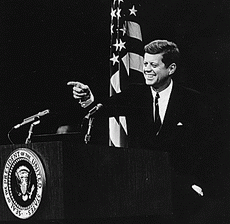![]()
Rhetoric of John F. Kennedy, Robert & Edward Kennedy
SELECTED
BIBLIOGRAPHY
Allan Louden, Wake Forest University (louden@wfu.edu)
3Last Updated:Wednesday, 18-Feb-2015 15:03:52 EST

Benson, T. W. (2003). Writing JFK: Presidential Rhetoric and the Press in the Bay of Pigs Crisis. College Station: Texas A&M Press.
Carpenter, R. H. (forthcoming). Rhetorical eloquence: John F. Kennedy's inaugural address. College Station, TX: Texas A&M University Press.
Clark, E. C. (2005). JFK and civil rights: Sooner or later. In J. A. Aune and E. D. Rigsby (Eds.) Civil rights rhetoric and the American presidency (pp. 114-133) . College Station, TX: Texas A&M University Press.
Clark, T. (2004). Ask not: The inauguration of John F. Kennedy and the speech that changed America. New York: Henry Holt and Co.
Dean, K. W. (1991). "We seek peace-But we shall not surrender:" JFK's use of juxtaposition for rhetorical success in the Berlin crisis. Presidential Studies Quarterly, 21, 531-544.
Depoe, S. P. (1989). "Qualitative Liberalism": Arthur Schlesinger, Jr. and the persuasive used of definition and history. Communication Studies, 40, 81-96.
Depoe, S. P. (1990). Requiem for liberalism: The therapeutic and deliberative functions of nostalgic appeals in Edward Kennedy's address to the 1980 Democratic National Convention. The Southern Communication Journal, 55, 175-192.
Depoe, S. P. (1991). Space and the 1960 presidential campaign: Kennedy, Nixon, and "public time." Western Journal of Communication, 55, 215-233.
Dorsey, L. G. (1996). The myth of war and peace in presidential discourse: John Kennedy’s "New Frontier" myth and the Peace Corp. Southern Communication Journal, 62, 42-55.
Edwards, J. L. (2004). Echoes of Camelot: How images construct cultrural memory through rhetorical framing. In C. A. Hill, & M. Helmers (Eds.), Defining visual rhetorics (pp. 179-194). Mahwah, NJ: Lawrence Erlbaum Asscoates, Inc.
Golden, J. L. (1966). John F. Kennedy and the 'Ghosts'. Quarterly Journal of Speech, 52, 348-357.
Goldzwig, S. R., & Dionisopoulos, G. N. (1995). Legitimating liberal credentials for the presidency: John F. Kennedy and The Strategy of Peace. Southern Communication Journal, 60, 312-331.
Goldzwig, S. R., & Dionisopoulos, G. N. (1994). "In a perilous hour": The public address of John F. Kennedy. Westport, CT: Greenwood Publishing.
Goldzwig, S. R., & Dionisopoulos, G. N. (1989). John F. Kennedy's civil rights discourse: The evolution from "principled bystander" to public advocate. Communication Monographs, 56, 179-198.
Griffin, L. M. (1984). When dreams collide: Rhetorical trajectories in the assassination of President Kennedy. Quarterly Journal of Speech, 70, 111-131.
Gustainis, J. J. (1989). John F. Kennedy and the Green Berets: The rhetorical use of the hero myth. Communication Studies, 40, 41-53.
Harding, H. F. (1960). John F. Kennedy: Campaigner. Quarterly Journal of Speech, 46, 362-364.
Jacobs, L. R., Shapiro, R. Y. (1994). Issues, candidate image, and priming: The use of private polls in Kennedy's 1960 presidential campaign. American Political Science Review, 88, 527-540.
Jensen, R. J., & Hammerback, J. C. (2005). Calling Washington collect: Robert Parris Moses and the Kennedy administration. In J. A. Aune and E. D. Rigsby (Eds.) Civil rights rhetoric and the American presidency (pp. 134-154) . College Station, TX: Texas A&M University Press.
Jordan, J. W. (2003). Kennedy's romantic moon and its rhetorical legacy for space exploration. Rhetoric & Public Affairs, 6, 209-232.
Kimble, J. J. (2009). John F. Kennedy, the construction of peace, and the pitfalls of androgynous rhetoric. Communication Quarterly, 57, 154-170.
Ling, D. A. (1997). A pentadic analysis of Senator Edward Kennedy’s address to the people of Massachusetts July 25, 1969. Central States Speech Journal, , 81-86.
Meagher, M. E. (2006). John F. Kennedy and Ronald Reagan: The challenge of freedom. Journal of Interdisciplinary Studies, 18, 1-24
Mullen, J. J. (1963). Newspaper advertising in the Kennedy-Nixon campaign, Journalism Quarterly, 40, 3-11.
Murphy, J. M. (2004). The language of the liberal consensus: John F. Kennedy, technical reason, and the "New Economics" at Yale University. Quarterly Journal of Speech, 90, 133-162.
Murphy, J. M. (2000). Crafting the Kennedy legacy. Rhetoric and Public Affairs, 3, 577-601.
Natalle, E. J. (2004). Jacqueline Kennedy. In M. M. Wertheimer (Ed.) Inventing a voice (pp. 243-272). New York: Rowman & Littlefield.
Osborn, L. L. (1980). Rhetorical patterns in president Kennedy's major speeches: A case study. Presidential Studies Quarterly, , 332-335.
Schudson, M. (2000). Image: The Kennedy-Nixon debates. Media Studies Journal, 14, 122-124.
Silvestri, V. N. (2000). Becoming JFK: A profile in communication. Westport, CT: Praeger Publishers.
Stuckey, M. E.& Abtczak, F. J. (1991). Campaign and character: Robert Kennedy in the 1968 presidential campaign. In D. W. Parson (Ed.), Argument in controversy: Proceedings of the Seventh SCA/AFA Conference on Argumentation (pp.140-146), Annandale, VA: Speech Communication Association.
Tofel, R. (2005). Sounding the Trumpet: The Making of John F. Kennedy's Inaugural Address. Ivan Dee.
Warnick, B. (1996). Argument schemes and construction of social reality: John F. Kennedy’s address at the Houston Ministerial Association. Communication Quarterly, 44, 183-196.